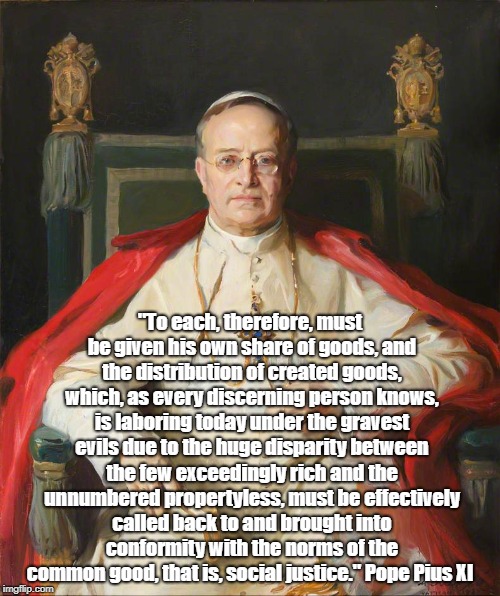
Someone, somewhere (for I must protect the innocent and befuddled) recently proclaimed that, yes, it is true, we owe the Church religious assent even when it does not speak infallibly, but that all said, I will “eat my hat” if you can find the term “social justice” in any encyclical.
Really?
Here is Quadragesimo Anno, by Pope Pius XI, in 1931, where it appears nine times. (§57, 58, 71, 74, 88, 101, 110, 126). Pius XI writes:
To each, therefore, must be given his own share of goods, and the distribution of created goods, which, as every discerning person knows, is laboring today under the gravest evils due to the huge disparity between the few exceedingly rich and the unnumbered propertyless, must be effectively called back to and brought into conformity with the norms of the common good, that is, social justice.
Social justice is “the norms of the common good,” the pope says. It requires a just wage, he says in 71. If the family is in a situation of “extraordinary needs,” an employer must pay an even higher wage still. Social justice is part of the moral “law,” says the pope in 57. The CHurch, he says in 126, is “striving to restore society according to the mind of the Church on the firmly established basis of social justice.” By 1931, social justice has already been “firmly established.”
Here is Mater et Magistra, thirty years later in 1961, written by Pope John XXIII. There, “social justice” appears three times. “All forms of economic enterprise”—all forms—“must be governed by the principles of social justice and charity” (§39). The term is also found in §40 and 69.
Four years later, in 1967, Pope Paul VI used the phrase “social justice” four times in Populorum Progressio. Social justice, he says, is an “obligation” of the wealthier nations (§44). Only when trade conforms to social justice can it be called just at all (59).
Here is Laborem Exercens (1981). Pope St. John Paul II uses the term four times. A concern for social justice, he ought move us to oppose “the disproportionate distribution of wealth and poverty.” It requires “solidarity” with labor. Listen to what the pope says on this point:
Social justice is “a proof of fidelity to Christ.” Imagine that!This solidarity must be present whenever it is called for by the social degrading of the subject of work, by exploitation of the workers, and by the growing areas of poverty and even hunger. The Church is firmly committed to this cause, for she considers it her mission, her service, a proof of her fidelity to Christ.
And unions, says St. John Paul Ii, are good because they are a “mouthpiece for the struggle for social justice.” Unions fight for “the just rights of working people.”
Ten years later, in Centesimus Annus, St. John Paul II spoke of “social justice” as part of the fight against Communism. Social justice, he says, will “deprive Communism of the revolutionary potential represented by masses of people subjected to exploitation and oppression.”
(Really, you’d think conservatives would embrace this.)
And then there is Caritas in Veritate. Here, Pope Benedict XVI says:
The social doctrine of the Church has unceasingly highlighted the importance of distributive justice and social justice for the market economy, not only because it belongs within a broader social and political context, but also because of the wider network of relations within which it operates. In fact, if the market is governed solely by the principle of the equivalence in value of exchanged goods, it cannot produce the social cohesion that it requires in order to function well.
Now, the Compendium of the Social Doctrine of the Church uses the term ten times. The Catechism has a whole section on social justice. And you will also find it in Gaudium et Spes. But this person asked for encyclicals. And indeed, encyclicals are among the most authoritative teaching documents a pope can write.
But yes, you will find the term in encyclicals. You will find it many times in many of them. Tolle, lege, and don’t come up with clever schemes, found in politics, to avoid what the Church teaches. Well, this is not infallible. Well, but I need to find it in this kind of Church document. Well, but the Church doesn’t really mean. No, no, no.
No comments:
Post a Comment